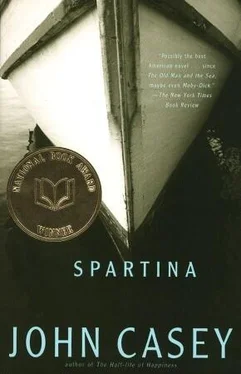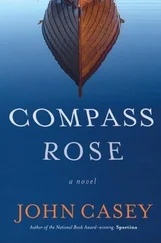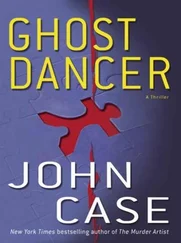Elsie did it again. Not an exact fix, but a smaller triangle. Dick turned on the depth finder. It flashed a reading. He said, “See if where you put us has that depth.”
Elsie nodded.
Dick said, “Now flip that switch over there and get a reading from the loran.”
Elsie read the numbers and found them on the chart. “Why didn’t you just use the loran?”
Dick said, “Because things get broke. If the RDF breaks there’s another way, but I don’t have time to show you now. Get Parker to show you where the coffee’s at. Ask Parker to take the wheel so I can go up and start looking. Bring my coffee on up. Lots of milk, no sugar.”

D ick went up to the crow’s nest. There was a long swell, which gave a good deal of motion to the crow’s nest, but the sea was perfect, not a tear in the whole sheet of surface. Not yet six. They might get the plane by eight. He’d be tired by the end of it, but for the moment it felt good to let his gaze stretch out. The soft-seen sea was an ointment across the front of his brain. He looked far out and then wandered back, his eyes relaxed. He squinted and swept past the first rim of brightness.
After an hour Elsie came up. She had her camera on a padded U strapped over her shoulder. She took a shot of the bow pulpit with the harpoons lashed to it. She swung around and shot their wake, the only troubled water.
“What do you see when you see a swordfish? A fin?”
“Sometimes you see the fin. Sometimes just an inch or so of fin. Looks like a floating stick. If your eyes are good, you can spot a fish a couple of feet down just by the way it disturbs the surface. If it’s choppy, you can’t see ’em. If it’s overcast, they don’t fin.”
“Why’s that?”
“They come up so the sun’ll kill worms that get in them. No sun, no fin. So you just hope for a day like this.”
“And when you see one …?”
“We nose up on him.”
“You mean you sneak up on it?”
“You just come up on him. Sometimes he can even see the boat, he’s not scared. A shadow scares him, so you come into the sun.”
Elsie said, “And then what?”
“Then I get up in the pulpit. I stick him. The lily — that’s the piece with the point and the barb — see it there. It comes right off the shaft. The lily has the line tied to it. The fish takes off, the line pays out. At the end of the line is a float. See there, the beer keg with the ring. If the line was fast to the boat, the fish could pull against the weight, tear the lily out. But when he pulls against the keg, the keg goes down some. When he eases off, the keg buoys back up. Same reason you use a fishing rod. It gives with the fish when the fish pulls, it pulls when he eases. Always tension, but no jerks.”
“But if the keg is overboard, how do you pull the swordfish in?”
“You follow along after the keg. When the fish is dead, or just about dead, you can get the keg, and go right up and gaff the fish. We have a tail gaff. It’s a wire noose that goes over the tail. Just forward of the tail even a big fish is no thicker than my arm. You get hold of that, you’ve got him. Pull him in and knock him on the head. Be sure you and Schuyler stand clear. The sword is as big as a baseball bat, and he can swing it. That’s how they kill what they eat. They don’t stick it. They swim into the school and whap that sword back and forth. Then they circle back and eat the fish they’ve whapped. The tail can knock you overboard too.”
“Then what?”
“We kill him, gut him, put him on ice.”
“How many do you think we’ll get?”
“I’ve heard of a boat getting six in a day. And I’ve been out on a boat didn’t get but one all summer. There’s no guarantee. The plane helps. If the water temperature’s right, the sea’s smooth, the tide isn’t running too hard, and you get a plane spotting, it’d be bad luck not to get one in four days. We’ll be out past the swordfish grounds to set some pots, but we’ll do that early and get back around here for the daylight. Then, the third night, we’ll go out to pull the pots, and keep looking on the way home. After three or four days you get so you can’t see so good.”
They stood quietly for a while, each in their hip-high steel hoop, Elsie with her left arm around the mast. Dick surprised himself by starting to talk again.
“There’s a knack to how you look. You got to … unfocus your eyes. What you want to do is let as much come in as you can. You don’t so much see a fish as you just get a feeling that something’s different. You just feel a speck on your screen. Then you focus in. Most of the time it’s a shadow of a wave, or seaweed, or flotsam. You’d be surprised how much junk there is out here.”
“And you see sharks too, I imagine.”
“Yup. And if you see one, you see fifty. If we stick a fish, it’s likely there’ll be sharks about by the time we pull him in.”
“So they might eat the swordfish. And you get nothing?”
“Oh no. As long as he’s got any life, they’ll stay clear of his bill.”
“How long does the swordfish live after you harpoon him?”
“Depends. If I buttonhole him, not long. Anywheres from a minute to a half-hour. If I just barely get the lily in, it could go on and on.”
“But can’t he swim faster than the boat?”
“Not for long — not towing a beer keg.”
“Ah.”
Dick liked this conversation, his eyes looking far and near, their voices coming in from some far-off station. He half-realized, half-remembered that when he was out for a long time in his skiff he talked to himself. Usually chewing on something bitter. When he felt good, he didn’t say much. If he pulled a pot and got something worthwhile, he might say, “If they all came up like this, it wouldn’t be so bad.”
He almost missed it. For a while he couldn’t find it again. He got a hint at the side of his eye and flicked toward it. Something. He yelled down to Parker and pointed. Parker headed the boat over.
Elsie said, “Where is it?” Dick was on his way down, keeping the dot in view, so he ignored her. When he got out on the bow pulpit, they were three or four hundred yards off. Another minute and he saw it was too black to be a swordfish. Dick rechecked the keg, the line, the lily, the knots. He motioned to Parker which way the fish’s head lay. Parker swung the boat out in a curve, lined her up, and came ahead slow. It was a black marlin. Not too big. The aluminum shaft felt funny. Too late to get the wood one. He looked at the coiled line and keg, set his feet. Parker was letting the boat glide in. Dick felt the rail across his hips. He pressed into it. He raised up with the harpoon. The lily was way out front, a long way down, it seemed to be floating away from him. The bow came down off the swell. Dick lined up the lily and the thickest piece of fish. He jammed it in. The fish disappeared. Dick wasn’t sure if he’d got it in until he saw the line pay out strong. He retrieved the shaft and got a grip on the rail in case he had to raise his feet. He got behind the keg and propped it up. The line peeled down to the last few coils. The keg went over, skipped twice, and then splashed through the top of a swell. Dick pointed to the keg in case Parker had missed it. Parker ground the engine into gear.
Dick looked back and saw that Elsie was filming from the crow’s nest. Schuyler was leaning out over the side with his camera too.
Dick shouted to him, “If you go over, we pick the fish up first.” Schuyler ignored him.
Читать дальше













